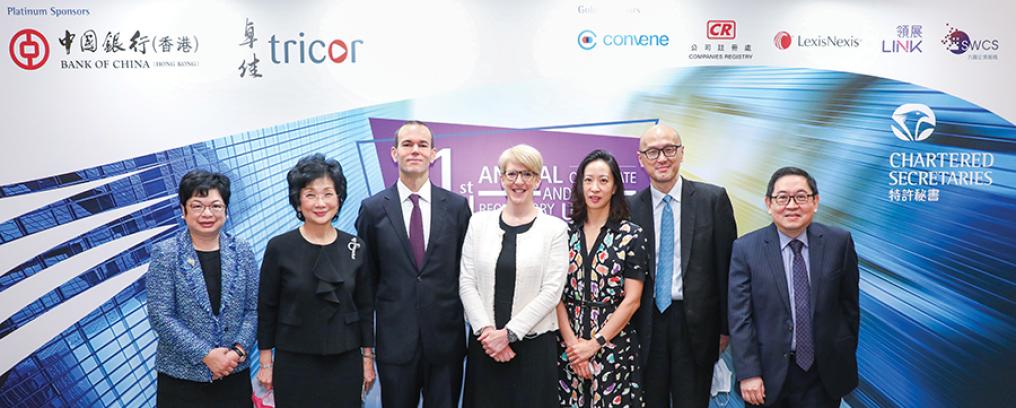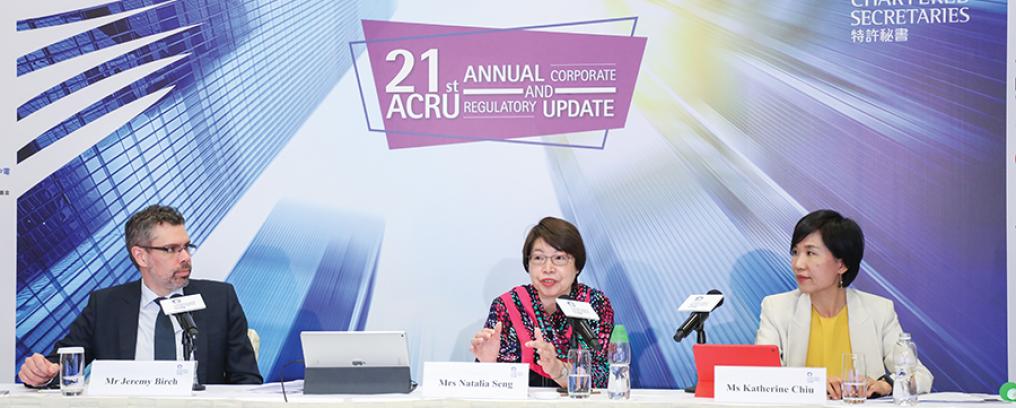A central theme to emerge from the Institute’s 21st Annual Corporate and Regulatory Update (ACRU) webinar, held on 5 June, was that regulators in Hong Kong will increasingly be holding individual executives, board members and professional practitioners accountable for corporate misconduct.
Companies act through individuals, but ambiguity around the roles and responsibilities of the people within organisations has meant that enforcing individual accountability has not been easy. However, the regulatory environment, both in Hong Kong and globally, is changing and regulators are using every available power they have to hold individuals accountable for corporate misconduct.
Who is at risk of enforcement action?
In Session 1 of this year’s ACRU, Jon Witts, Head of Enforcement, Listing Division, Hong Kong Exchanges and Clearing Ltd (HKEX), pointed out that companies can only operate through their people. For every breach of rules by a company, there are individuals who have either caused or allowed the company to fall into breach. He emphasised that, while directors are obviously a key focus of HKEX enforcement work, the regulator will look at everyone who is at fault.
Senior management and professional advisers have a responsibility to ensure that issuers are run effectively and in compliance with the rules. He added that company secretaries, advisers and managers who work closely with directors, a category that applies to many people in the ACRU audience of course, have a key role in guiding directors to act in a compliant manner. He urged ACRU attendees to familiarise themselves with directors’ fiduciary duties and duties of care, skill and diligence as set out in the listing rules.
He then addressed some of the common defences or explanations put forward by directors in HKEX enforcement investigations.
Ignorance is no defence
Individuals sometimes claim ignorance of the rules or the facts of the case. Mr Witts pointed out that this is no defence at all since it is the responsibility of directors to know the rules and the facts of the case. A variant of this defence is the argument that the directors were newly appointed and still unfamiliar with their obligations. Mr Witts pointed out that there is no grace period for new directors. This is where director induction in the first weeks of their appointment plays a key role. Directors need in particular to look at the robustness of the company’s internal controls because, if the controls are unsatisfactory, not only the company but the directors themselves will be at risk.
Another defence relied on is that the directors delegated responsibility for handling the issue in question. Where the executive directors have engaged in malpractice and the independent non-executive directors (INEDs) have claimed ignorance of the facts of the case, HKEX will look at whether the INEDs failed to ask the right questions or failed to use their independent judgement, or had failed to put in place controls and procedures that may reduce the risk of malpractice or result in its detection more readily. Where the executive directors claim that the INEDs on a particular board committee were given charge of the issue, Mr Witts pointed out that the board as a whole still has to maintain a requisite level of oversight. ‘Delegation is permitted and is often essential, but our investigations will look at whether the delegation was properly handled. If you have the right mindset and are questioning everything, you are on the right track,’ Mr Witts said.
The question as to whether different types of directors can be treated differently under the law was further explored in the Q&A at the end of Session 1. Edith Shih, FCG(CS, CGP) FCS(CS, CGP)(PE), the then International President, The Chartered Governance Institute; former Institute President; Executive Director and Company Secretary of CK Hutchison Holdings Ltd; and Chair of Session 1, asked whether it would be right for professional practitioners to be penalised for their special expertise – this after all would be a deterrent for these people to become INEDs.
Mr Witts said there was no intention to pursue individuals simply because they had particular qualifications. Where a professional practitioner has been given the lead in looking at a matter, the other directors still have a responsibility to ensure that the matter is properly handled. He emphasised that directors will be held accountable both for their collective and individual responsibilities. ‘Some directors seem to have lost sight of the concept of collective responsibility. Whilst the case in respect of each person will be looked at individually, the principle of collective responsibility means that it will often be no real defence for one director simply to point out that another director is more to blame,’ he said.
Lastly, another common defence relied on by directors is that the malpractice was successfully hidden and no controls could have stopped it from happening. Mr Witts pointed out that one of the jobs of directors is to ensure that adequate internal controls are in place. Malpractice and fraud may flourish in an environment where checks and controls are weak, or where the company culture creates an environment in which breaches of the rules are allowed to happen.
Mr Witts devoted the final part of his presentation to the solutions to the problems highlighted above. He emphasised that having the right mindset is the key starting point. Having the right mindset at the very least means devoting sufficient time and attention to understanding the business, maintaining an active interest in its affairs and applying a questioning mind to the information provided by management. The listing rules might seem complex, he suggested, but directors should above all bear in mind the very straightforward requirements of Listing Rule 3.08 – namely the requirement for directors to have an active interest in the issuers affairs, a general understanding of its business and to follow up on anything untoward.
Individual accountability – a practitioners’ perspective
Two years ago, the ACRU formula – which initially focused on facilitating the regulator/regulatee dialogue – was expanded to include the new Practitioners Sharing sessions. These sessions, designed to provide participants with insights from seasoned professionals on how to implement best practices, have subsequently become a major draw for ACRU participants and the three Practitioners Sharing sessions of this year’s ACRU complemented many of the regulators’ presentations in the webinar.
Practitioners Sharing Session 1, chaired by Gillian Meller FCIS FCS, Institute President and Legal and European Business Director, MTR Corporation Ltd, focused on the latest trends in regulation and enforcement by the Securities and Futures Commission (SFC) in Hong Kong. She was in conversation with Jill Wong, Partner, Howse Williams, and Alva Lee, Head of Internal Audit & Risk Compliance Services, Hong Kong, KPMG China.
Ms Wong warned practitioners that the SFC is just as keen as HKEX to enforce individual accountability in Hong Kong. She pointed out that this trend is not in fact a new one. The SFC has had its Responsible Officer regime for a long time, at least since 2003, and brought in its Manager-in-Charge (MIC) regime in 2017. The MIC regime aims to ensure that there are named individuals with responsibility for overseeing the core functions of licensed corporations. Ms Wong emphasised the need for licensed corporations to train their MICs, especially those in IT, Operations and HR, to understand their obligations and liabilities under the regime. ‘They might have no idea of what accountability to a regulator will really mean,’ she said.
She added that all market participants, not only those directly liable under the MIC regime, need to understand the aims of the MIC regime. The people running the company set the tone from the top but often they are not in the front line for accountibility. ‘The controlling minds may stay in the shadows in the hope of escaping accountability, but the SFC will use the full extent of its enforcement powers to ensure that they are held accountable,’ she said.
While the SFC has continued to pursue its ‘front-loaded’ philosophy – combining early regulatory intervention in listing matters and enhanced supervision of intermediaries – it has backed this up with focused enforcement actions against firms with important gatekeeping functions and individuals in senior roles.
Ms Wong recommended that practitioners monitor the public interest statements and the announcements of disciplinary actions issued by regulators in Hong Kong. ‘These statements are useful since they help to educate the market – giving practitioners a good idea of what the regulators expect in terms of compliance,’ Ms Wong said.
Handling SFC investigations
The panel discussion at the end of Practitioners Sharing Session 1 looked at how to handle regulatory investigations. Ms Meller presented Ms Wong and Ms Lee with a fictional scenario whereby, late on a Friday afternoon, a company secretary receives a letter from the SFC asking for information relating to an inside information case that they are investigating.
The discussion emphasised the need to, firstly, cancel any plans you may have had for the weekend. You would then be well advised to read the letter in detail – in particular to ascertain whether your organisation is suspected of malpractice – and consult your head of legal on who can be informed of the investigation in compliance with statutory requirements for secrecy. This will usually include whoever has responsibility for inside information compliance within your organisation, as well as the CEO, the board chairman and the board committee with responsibility for inside information.
You should then get back to the SFC to let them know you are handling the matter – often a phone call is preferable since you can ask for further details of the case. You can then look at your legal obligations for making any necessary disclosures (taking into account any confidentiality requirements) and whether a halt in trading will be needed.
Subsequent steps should include appointing an officer, usually the head of legal, company secretary or head of compliance to lead a thorough fact-finding investigation of the matter and securing all documents relating to the investigation. This might include ensuring that relevant documents don’t get destroyed as part of a routine record destruction policy – even if the usual retention period has expired.
The panel discussion also addressed the procedures to be followed if the letter accuses a specific director. For example, the director in question should be excluded from any internal enquiries and any board discussions of the matter, but what information can be shared with that director? Should the director be suspended if evidence of malpractice is found? Moreover, should the organisation pay for independent legal advice for the accused director?
Ms Meller added that it is useful to have guidelines on what legal support will be provided for directors who become the subject of investigations. Another best practice recommendation is to have the question: ‘Is this inside information?’ at the end of all board papers to prompt directors into a consideration of the inside information implications of all issues considered by the board.
The 21st Annual Corporate and Regulatory Update (ACRU) of The Hong Kong Institute of Chartered Secretaries was held on 5 June 2020.
SIDEBAR: ACRU – the new format
The Institute’s Annual Corporate and Regulatory Update (ACRU) is the largest-scale event, in terms of attendance figures, in its CPD calendar. Holding this year’s ACRU in the midst of a global pandemic clearly called for a change to the format and, in keeping with the Institute’s current policy for its CPD events, ACRU was held as a webinar.
The change of format did not result in a significant fall in the number of attendees – the event attracted over 1,900 participants – neither did it result in any reduction in the number of questions in the webinar’s Q&A sessions. This is testimony both of the degree to which online learning and communication, and the technology which makes this possible, has become the new normal, but also of the abiding popularity of the dialogue that ACRU facilitates.
Gillian Meller FCIS FCS, Institute President, pointed out in her welcoming address that holding the forum as a webinar does not mean losing any of the functionality it would have in an in-room setting. ‘Crucially, participants can ask questions in the Q&A sessions from whatever device they are using to attend,’ she said. ‘For this reason, I believe that COVID-19, far from being a setback, will have a positive legacy for ACRU that will widen the accessibility of the forum.’



